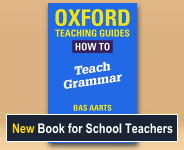Topic: Inflection
These resources cover how words change their form (typically by adding different endings) in different grammatical contexts. For example, the verb hop has the forms hop, hops, hopped and hopping.
Englicious contains many resources for English language in schools, but the vast majority of them require you to register and log in first. For more information, see What is Englicious?

